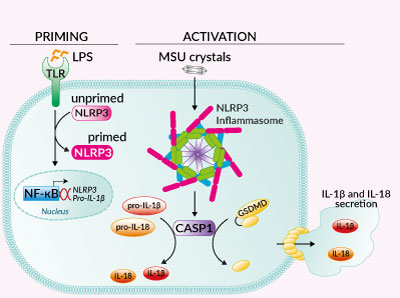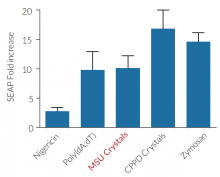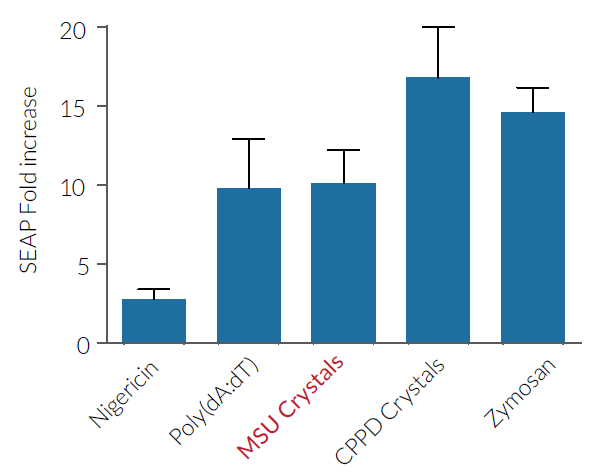MSU Crystals
| Product | Unit size | Cat. code | Docs. | Qty. | Price | |
|---|---|---|---|---|---|---|
|
MSU Crystals Monosodium Urate Crystals |
Show product |
5 mg 25 mg |
tlrl-msu
|
|

Inflammasome activation with MSU crystals
NLRP3 inflammasome Inducer - Monosodium Urate Crystals
Monosodium urate (MSU) crystals are the aetiological agent of the acute inflammatory condition gout. They act as a key danger-associated molecular patterns (DAMPs) able to stimulate the NLRP3 inflammasome-dependent induction of interleukin-1β (IL-1β) and IL-18 [1].
The biological activity of MSU crystals has been validated using InvivoGen's THP1-HMGB1-Lucia™ cells and HEK-Blue™ IL-1β cells.
 InvivoGen also offers:
InvivoGen also offers:
• HEK-Blue™ IL-1β: IL-1β Sensor Cells
• THP1-HMGB1-Lucia™: Pyroptosis Reporter Cells
Key features:
- Potent inducer of the NLRP3 inflammasome
- Each lot is functionally tested
![]() Read our review on the NLRP3 inflammasome.
Read our review on the NLRP3 inflammasome.
![]() Download our Practical guide on Inflammasomes.
Download our Practical guide on Inflammasomes.
Reference:
1. Martinon F. et al., 2006. Gout-associated uric acid crystals activate the NALP3 inflammasome. Nature. 440(7081):237-41.
Back to the topSpecifications
Working concentration: 100 - 200 µg/ml
CAS number: 1198-77-2
Linear formula: C5H3N4NaO3
Molecular weight: 190.1 g/mol
Structure: Triclinic crystals characterized by X-ray diffraction
Solubility: Not soluble
Back to the topContents
Monosodium urate (MSU) crystals are available in two quantities:
- tlrl-msu: 5 mg
- tlrl-msu-25: 25 mg
![]() MSU crystals are shipped at room temperature.
MSU crystals are shipped at room temperature.
![]() Store at 4 °C for 1 year.
Store at 4 °C for 1 year.
Details
MSU crystals act as endogenous danger signals that stimulate the innate immune system to produce inflammatory cytokines such as IL-1β. Engagement of the NRLP3 inflammasome is supported by the finding that macrophages from mice deficient in various components of the inflammasome did not respond to injection of MSU crystals [1].
The NLRP3 inflammasome is an intracellular multi-protein complex that plays a central role in innate immunity. It is activated by a two-step process. A first signal (‘priming’) is provided by pathogen-associated molecular patterns (PAMPs) or cytokines. It allows the transcriptional upregulation of key inflammasome actors and the post-translational modification of NLRP3 . The second signal (‘activation’) is provided by a wide array of stimuli including microbial toxins, endogenous molecules or crystalline substances. The current paradigm is that NLRP3 does not bind directly to these molecules. Rather it senses downstream cytosolic stress signals such as K+ efflux. This triggers inflammasome multimerization and pro-caspase-1 maturation. Proximity-induced autolytic activation of caspase-1 leads to the formation of gasdermin D (GSDMD) pores at the cell surface, allowing IL-1β/IL-18 and alarmin secretion, and ultimately, pyroptosis [2,3].
References:
1. Martinon F. et al., 2006. Gout-associated uric acid crystals activate the NALP3 inflammasome. Nature. 440(7081):237-41.
2. Swanson K.V. et al., 2019. The NLRP3 inflammasome: molecular activation and regulation to therapeutics. Nat. Rev. Immunol. 19:477.
3. Groslambert M. & Py B. 2018. Spotlight on the NLRP3 inflammasome pathway. J. Inflamm. Res. 11:359.
Chemical structure of MSU Crystals:







